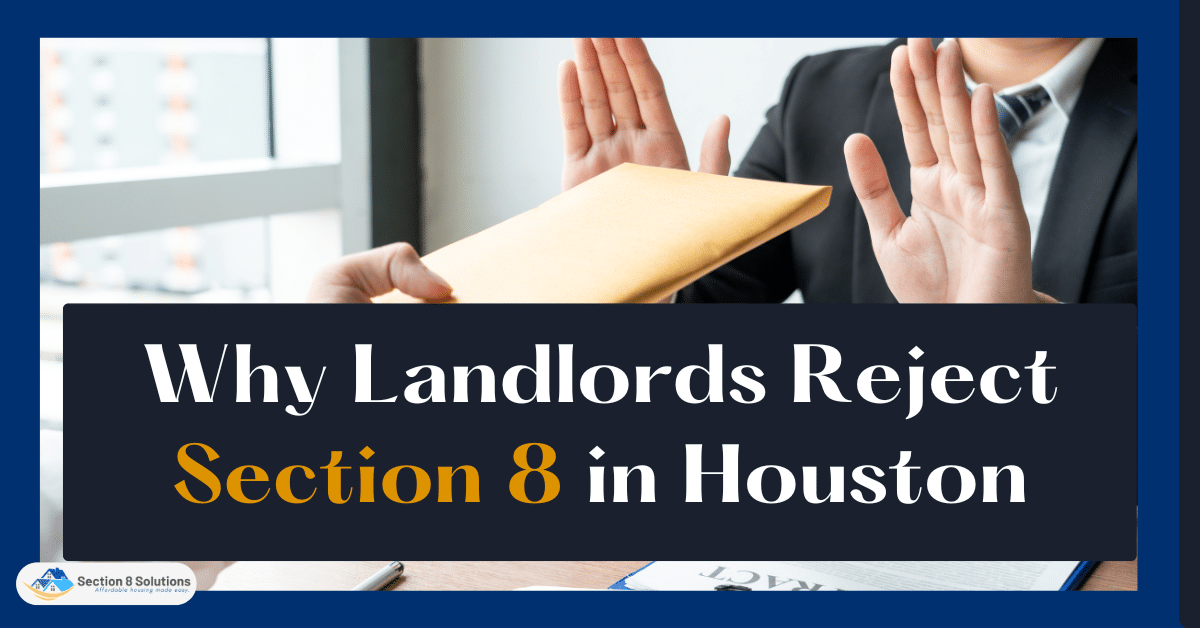Landlords in Houston often reject tenants who receive housing assistance through the Section 8 program. The reasons for this vary, but they often stem from misconceptions about the program and concerns about the administrative burden, rent payments, and property damage.
In this article, we will explore the reasons why landlords reject Section 8 in Houston, the challenges faced by tenants and housing authorities, and the potential solutions to this problem.

What is Section 8?
Section 8 is a federal housing assistance program that provides rental vouchers to eligible low-income families, seniors, and individuals with disabilities. The program is administered by the U.S. Department of Housing and Urban Development (HUD) and aims to help eligible households pay a portion of their monthly rent.
Under the program, eligible households receive a voucher that can be used to pay for housing in the private rental market. The amount of the voucher is based on the family’s income, household size, and local rental rates. Typically, the family is required to pay 30% of their income towards rent and utilities, while the voucher covers the remaining portion.
There are two types of Section 8 vouchers: tenant-based and project-based. Tenant-based vouchers are tied to the family, which means that they can use the voucher to rent any housing that meets program standards. Project-based vouchers are tied to specific rental units, which means that the family can only use the voucher to rent that particular unit.
To be eligible for Section 8, households must meet certain income and citizenship requirements. Generally, families must have an income that is below 50% of the area median income, although some areas may have different income limits. Additionally, at least one member of the household must be a U.S. citizen or eligible non-citizen.
Section 8 is an important program in providing affordable housing for low-income families, seniors, and individuals with disabilities. Without it, many families would struggle to afford safe and stable housing, which can have negative consequences for their health, education, and employment opportunities.

Why do landlords reject Section 8 tenants in Houston?
Houston, like many US cities, lacks low-income housing. Section 8, which provides rental assistance vouchers to qualified households, is crucial to fixing this. Houston landlords refuse Section 8 tenants, making it hard for families to find safe, affordable housing. This section discusses why Houston landlords reject Section 8 tenants and how it affects low-income families and the city.
Landlords in Houston reject Section 8 tenants for a variety of reasons, including:
- Lack of knowledge about the program and misconceptions about tenants: Landlords unfamiliar with Section 8 may misunderstand voucher holders. Section 8 renters may be rejected by landlords who think they are untrustworthy or have bad credit.
- Administrative burden and paperwork requirements: Section 8 landlords must fill out a lot of paperwork and undergo inspections, which may be time-consuming. Landlords may also have to attend training sessions and follow program guidelines, which adds administrative work.
- Concerns about rent payments and property damage: Section 8 tenants’ late rent payments and property damage may deter landlords. Section 8 tenants may be more prone to damage property or not pay rent, which can cost landlords money.
- The stigma associated with low-income housing and concentration of poverty: Due to worries about poverty in some neighborhoods, some landlords may be hesitant to rent to Section 8 residents. Some landlords worry that Section 8 renters may lower their property values.
- Legal and financial risks for landlords: Section 8 renters pose legal and financial hazards for landlords. Landlords may be liable for accidents or damages on their premises, which can be costly. Landlords may also worry about evicting Section 8 tenants who break their leases.
These challenges make it difficult for Section 8 tenants to find affordable and safe housing, and contribute to housing insecurity and inequality in Houston.

What Are the Challenges Faced by Section 8 Tenants and Housing Authorities in Houston?
Houston Section 8 households and housing agencies face significant issues. Section 8 helps low-income families find safe, affordable homes in desirable neighborhoods, but there are still many roadblocks. In this section, we will analyze the issues Section 8 tenants and housing authorities in Houston confront, such as discrimination, limited resources, and bureaucratic processes, and their effects on low-income families and the community.
1. Limited Availability of Affordable Housing in Desirable Neighborhoods
Houston Section 8 households struggle to find cheap, desirable housing. Due to the city’s rapid population development and flourishing economy, low-income families can’t afford desirable housing. This is especially true for families who use rental assistance programs like Section 8, as many landlords in these neighborhoods may not participate or may refuse voucher users.
As a result, Section 8 tenants often face difficult choices when it comes to housing. They may have to choose between living in high-poverty neighborhoods with limited access to jobs, good schools, and other amenities, or living in less desirable areas far from family and social networks. This can have significant impacts on their quality of life and long-term outcomes.
Poverty clusters in Houston can further worsen social and economic inequality. High-poverty communities can harm health, education, and economic mobility, especially for children. Houston risks perpetuating these imbalances and trapping low-income families in poverty by restricting affordable housing in desired neighborhoods.

2. Landlord and Property Manager Discrimination
Discrimination and unfair treatment by landlords and property managers are pervasive issues for Section 8 tenants in Houston. Despite laws that prohibit discrimination based on the source of income, many landlords and property managers refuse to rent to voucher holders, citing concerns about payment reliability, potential damage to property, or the stigma associated with low-income housing.
Discrimination takes many forms. Some landlords deny Section 8 renters, while others require more screening or charge higher rents or security deposits. These tactics make it hard for voucher holders to obtain acceptable housing and can concentrate poverty in certain neighborhoods, as many Section 8 renters are compelled to reside in high-poverty regions with few job possibilities.
Moreover, discrimination against Section 8 tenants can have broader implications for the community as a whole. By limiting access to affordable housing in desirable areas, Houston risks exacerbating social and economic inequalities and perpetuating cycles of poverty and disadvantage.
Houston must enforce fair housing rules and educate landlords and property managers to fix this. This may involve informing landlords about Section 8 and fair housing access. It may also mean increasing landlord discrimination fines and offering renters resources to report and sue. Houstonians need safe, affordable housing and opportunities to prosper.

3. Section 8 Inspection Delays and Bureaucracy
Section 8 applications and inspections are vital to ensuring rental units satisfy health and safety regulations. This process can be lengthy and complex, frustrating residents and housing authorities. Due to the regulatory overhead, landlords may be unwilling to participate in Section 8 or drop out altogether, limiting affordable housing for Section 8 residents.
Insufficient inspectors make Section 8 inspections difficult. Due to this shortfall, tenants wanting to move in may have to wait longer for inspections. Inspectors must examine for mold, vermin, and electrical, and plumbing issues, which takes time.
In addition to inspection delays, the Section 8 application process can also be time-consuming and bureaucratic. Applicants must provide detailed information about their income, assets, and household composition, and must undergo a thorough background check. This process can take several weeks or even months and can be frustrating for tenants who are in need of immediate housing assistance.

4. Insufficient Resources and Budget for Housing Authorities to Enforce Fair Housing Legislation and Support Renters
Houston and other housing authorities struggle to support Section 8 tenants due to financial and resource shortages. Housing authorities ensure landlords follow fair housing regulations and treat tenants equally. Without sufficient resources, staffing, and finance, this is challenging.
One of the main challenges facing housing authorities is the lack of funding available to support their programs and services. Housing authorities must often rely on federal funding and grants to support their operations, which can be limited and unpredictable. This can make it difficult for housing authorities to plan and implement long-term strategies to support Section 8 tenants and improve housing outcomes.
In addition to funding challenges, housing authorities may also face staffing shortages, which can impact their ability to enforce fair housing laws and provide support to tenants. With limited staff and resources, housing authorities may struggle to keep up with the high demand for affordable housing and may be unable to provide timely assistance to tenants in need.
Houston and other housing authorities may need new funds and cooperation with local organizations and stakeholders to address these issues. This may include campaigning for more federal funding for affordable housing programs and working with local nonprofits, community organizations, and businesses to help Section 8 renters.

Case Studies and Examples of Successful Section 8 Integration in Houston
Houston, like many other cities, has faced challenges in integrating Section 8 tenants into the private rental market. However, there are also success stories of landlords, property managers, and tenants who have benefited from the program.
One example is the Houston Apartment Association, which partnered with the Houston Housing Authority to create the “Landlord Incentive Program”. This program offers financial incentives and support to landlords who accept Section 8 tenants, including marketing assistance, landlord training, and free unit inspections. This has helped to increase the number of available units for Section 8 tenants and improve landlord participation in the program.
Another success story is the case of a landlord in Houston who was initially hesitant to accept Section 8 tenants due to misconceptions about the program. However, after working with the Houston Housing Authority and learning more about the program, the landlord changed his mind and now has several Section 8 tenants who have been excellent renters and pay their rent on time.
In addition, there are success stories of Section 8 tenants who have found safe and stable housing through the program, including families with children and elderly individuals. These tenants have been able to access affordable housing in desirable neighborhoods and improve their quality of life.
Other cities and regions have also implemented successful strategies to address the issue of Section 8 rejection. For example, the city of Seattle created a program called “Open Doors” which provides financial incentives to landlords who accept Section 8 tenants and have a track record of good rental history. This program has helped to increase landlord participation in the program and reduce the concentration of poverty in certain areas.

Conclusion
Finally, Houston Section 8 renters and housing authorities face major obstacles, but there are answers. Houston’s Section 8 integration is hindered by a lack of affordable housing, landlord and property manager discrimination, application and inspection delays, and housing authority underfunding.
In Houston, Section 8 has helped landlords, property managers, and renters find safe and stable housing. We can create a fairer housing system in Houston by encouraging best practices and learning from other cities and areas that have effectively addressed Section 8 rejection.












